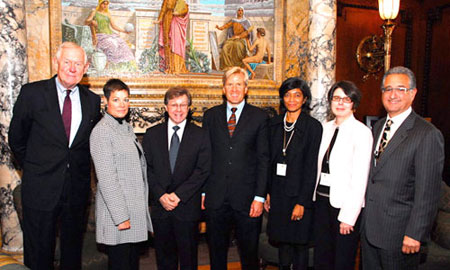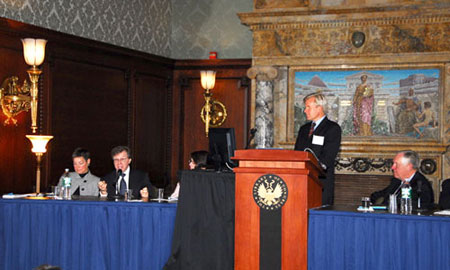Symposium Focuses on Copyright Collections in the Digital Age
Songwriters’ and composers’ interests took center stage at the Library of Congress on October 27 to inform Capitol Hill staff and the policy community why strong champions of creators’ rights are needed in the Digital Age. A panel of academics, government officials, composers, and music industry representatives gathered for a Washington summit organized by The George Washington University Law School’s Intellectual Property Law Program and Creative and Innovative Economy Center.
 Event participants (l-r): Ralph Oman, former Register of Copyrights and current Pravel Professorial Lecturer and GW CIEC Fellow; Susan Mann, Senior Director, Intellectual Property Policy, Microsoft Corp.; Maury Yeston, Tony Award-winning composer/lyricist, former Professor and Director of
Undergraduate Music Studies, Yale University; Co-Director GW IP Law Program Robert Brauneis; Bhamati Viswanathan, GW CIEC Research Associate; Tanya Sandros, General Counsel, U.S. Copyright Office; and Del Bryant, President & CEO, BMI.
Event participants (l-r): Ralph Oman, former Register of Copyrights and current Pravel Professorial Lecturer and GW CIEC Fellow; Susan Mann, Senior Director, Intellectual Property Policy, Microsoft Corp.; Maury Yeston, Tony Award-winning composer/lyricist, former Professor and Director of
Undergraduate Music Studies, Yale University; Co-Director GW IP Law Program Robert Brauneis; Bhamati Viswanathan, GW CIEC Research Associate; Tanya Sandros, General Counsel, U.S. Copyright Office; and Del Bryant, President & CEO, BMI.The meeting at the Library of Congress was the second in “The Creative Industries in Transition: New Directions for the Digital Era” series and showcases academic research papers that are supported by The George Washington University Law School and sponsored by BMI.
 Tony winning Broadway composer Maury Yeston makes an impassioned plea for copyright protection during the panel discussion. From left: Susan Mann, Yeston,Tanya Sandros, Robert Brauneis and Ralph Oman.
Tony winning Broadway composer Maury Yeston makes an impassioned plea for copyright protection during the panel discussion. From left: Susan Mann, Yeston,Tanya Sandros, Robert Brauneis and Ralph Oman.“Intellectual property is one of the driving forces of the economy, especially now with the financial troubles on Wall Street,” noted Ralph Oman, a Creative and Innovative Economy Center fellow who teaches copyright law at The George Washington University Law School and previously served as U.S. Register of Copyrights from 1985-1993. “Performing rights organizations work. They are the most transparent and most trustworthy solution to create value for and protect the rights of songwriters, composers, and their small businesses by collecting money around the world when their songs are performed. These organizations are a key part of the machinery.”
“Let us consider the massive and disproportionally positive influx of income the export of our intellectual property has on our nation’s balance of trade, not only in song, but also in film and theatrical products,” said program panelist Maury Yeston, Ph.D, a multiple Tony Award-winning Broadway composer and former director of undergraduate music studies at Yale University. “As someone who is currently in production with a $90 million American film musical, I know the strength and extension of copyright protection is in the national interest, even more critical during economic times like these,” said Dr. Yeston.
BMI President & CEO Del Bryant offered perspective from within the performing right arena, stating, “There is certainly no dispute that entertainment, information and copyright are in an era of dramatic change. This change has been has been evolutionary. Its been going on for a long time. For those of us in the music industry, it started nearly 15 years ago when music started to hit the web.
“It’s clear that entertainment is changing. As they say in the technology business, it’s scaling fast. Clearly, technology is nurturing an explosion of creativity. So will all of the 5 million bands on MySpace become commercial hits or even commercially viable? Probably not. But they do deserve a chance to express themselves and present their creative work to the public. When they do so, the copyrights that they create deserve our respect and, if the creator desires it, fair compensation when they are exploited. Likewise, businesses deserve a marketplace where they can get access to copyrights for a fair price and take their shot at building the next generation of entertainment.
“To make all of this happen, we need fair, market-driven copyright clearance and payment systems. You, as policy makers, are in a pivotal role to help frame these systems. Some innovative solutions have been proposed, ranging from Music Rights Organizations to ISP levy systems, global licensing solutions and more.
“Unfortunately, to date, the biggest winner in this evolving world has been inertia. It’s a paradox. We are here today to chip away at that inertia in a thoughtful and balanced way. We cannot wait until the next round of Congressional hearings or rate-setting proceedings to hurriedly craft the next big idea.
“We need to be proactive, and collaborative. We need to blend the best thinking from the best minds across all aspects of these issues and come up with solutions that work for creators and copyright owners, solutions that work for business and solutions that foster strong, progressive public policy for America’s copyrights both here in the U.S. and around the world.
“That’s why we launched the New Copyright Era initiative. We believe that a productive, balanced and thoughtful dialog among the academic, business and policy communities is crucial to setting the stage for the future of copyright — and the future of creativity. I thank you again for joining us today and hope you will keep up to date with the New Copyright Era Initiative at our website http://newcopyrightera.org.”






Community
Connect with BMI & Professional Songwriters